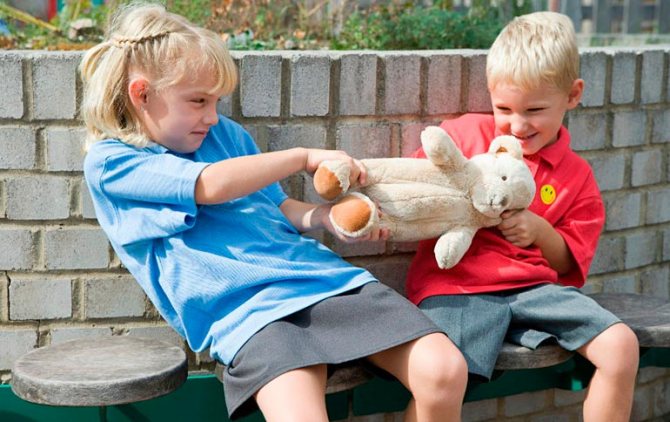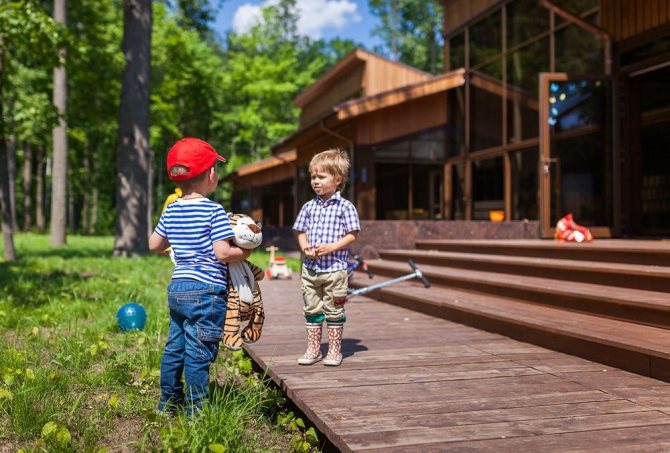When a baby refuses to share his toys, this displeases most parents. Adults become ashamed of their child’s behavior, they begin to reproach him, call him “greedy beef” and even punish him. Is it really bad not to share toys? How to cultivate generosity and respect for others in a little person?
Why are children greedy?
Oddly enough, greed is a normal quality of toddlers. At 2-3 years old, the baby often begins to say “this is mine”, “give it to me”. This makes parents sad. In the park you can often see a mother scolding her child for not sharing the car with his peer.
Reproaches and phrases like “you are doing badly, they won’t share it with you either” only cause the baby to cry. As a result, his toy is forcibly taken away and given to another. In such a situation, it is strange that a mother comes to the defense of someone else’s child and does not realize how much she offends her own.
Psychologists explain that a two-year-old toddler awakens to a sense of his own “I.” He slowly begins to realize that he exists and there is a big world around him. The baby perceives everything that belongs to him as part of himself. Therefore, in a situation when someone encroaches on his toy, the child simply protects the boundaries of his personal space.
If someone asks you for something that you value, would you give it to another person? Will being accused of greed affect your decision? Of course not. Imagine how your child feels when he is forced to share something. It is important for parents to understand that toys given to a child are perceived by him as personal property. He has the right to do with them as he wants. It would be strange if someone told us that we should share our mobile phone, wallet, computer, favorite cup, jewelry, car with other people, or we are greedy! Sounds funny.
For a child, his personal toys are the same value as our personal belongings are for us. He, just like an adult, has the right not to want to share his personal belongings with other people, including members of his family. This right must and is very important to respect.
The understanding that there is something “alien” comes a little later than the awareness of one’s “I”. That is why kids fiercely guard their own toys, but calmly take them from other children. This behavior is normal and only indicates that the child is developing. He just needs help to learn generosity faster.
Read also: My child is greedy - what should I do? Fight or accept? Causes of children's greed
Are you trying your best to teach your child not to be greedy, but he flatly refuses to share toys on the playground, and responds to any request to share with hysterics? In the video, together with psychologist Victoria Lyuborevich-Torkhova, we will identify five phrases that will help a child not be greedy:
Typical mistakes of parents
If there are several children in a family, parents often insist that the elders share everything with the younger ones. This approach causes jealousy in children. Older children begin to think that mom and dad love them more - their younger brothers and sisters.
To avoid offending your own child, try to avoid typical mistakes that parents make. The following rules will help:
- Do not reproach your child for greed and bad behavior. You bought toys for your baby, let him decide what to do with them.
- Do not forcefully take away a toy to give to another child. Your baby will regard this as a betrayal.
- Do not ask for forgiveness from the mother of a child who is begging something from your son or daughter. Your child is not obligated to do anything for others.
- Don't let others tell you that your baby is greedy.
- Don't make your child feel guilty. You should not make your baby feel guilty because another child is crying. In this situation, the owner of the toy is not to blame for anything. But the mother just has to explain to the other baby that there are their own toys and there are strangers that belong to other children.
- Do not forbid your child to take his toys from other children, but explain that he does this without using force. If this doesn’t work, ask the baby’s mother to take the toy herself and give it to you.
If you cannot do without lectures, condemn not the child, but his behavior. The words “greedy-beef” hurt the baby. Explain to him that hurting other children is bad.
The baby is very attached to his toys. If you take them away and demonstratively pass them on to other kids, the little person will develop a painful sense of ownership. When he grows up, he will continue to be greedy. Some psychologists argue that refusal to share a toy is a hidden children's fear of losing their mother. Moreover, she should not scold the child, because this will cause him serious injury.
At first the child is not greedy, but small
To begin with, it is important to learn to distinguish between normal baby behavior and what may seem like childish greed.
The baby lives in a world of desires. And at first, desires control him rather than he experiences them. One of the first stages of mental development is precisely to learn to distinguish one’s desires among a sea of other impressions. Then - correctly identify them and somehow respond to your own feelings, sensations, and needs.
As soon as a child learns to move in space, his interest in specific objects and actions with them will increase. This knowledge of the world is important for development, and the baby has a great call to explore everything around him. Instinct tells us: adults know how to be adults, so they themselves and everything that has to do with them attracts attention. The baby is trying to take possession of your things. But for him they are not so much things as a puzzle - I’ll solve it and become like mom and dad. And if he enthusiastically solves this problem, developing himself in his childish ways, then he feels that he is busy with an important task.
Like any person absorbed in the significant, he does not like to be disturbed. If you try to take away from your baby something that he needs now (to thoughtfully lick a shoe from all sides, for example), you will most likely understand that he does not want to give it to you. He honestly obtained an exhibit for experiments, and now he is being interfered with again. It is difficult to remain friendly in such a situation. If expropriation is repeated a hundred times a day, it can spoil anyone’s character.
How to teach a child to share?

It will not be possible to quickly instill in a child such qualities as generosity and respect. To do this, you need to stock up on considerable patience. Try to explain to your child that the toy is not being taken away from him forever, but only for a while. Try these techniques:
- Exchange. Let the kid give away his car for a while, and in return receive from the neighbor boy a pistol that he has liked for a long time;
- Sequence. If two children have their eyes on the same toy, set a schedule and control the play process from start to finish: one child plays for half an hour, the next half an hour for the second;
- The toy is not taken away forever. Try to convey to the child that the toy is not taken away, but only for a while, to play;
- The toy will not break. Explain to your child that if a neighbor’s boy plays with his favorite car, it will not be damaged and will return to you safe and sound;
- They may not share it with you either. Tell them that other children may not have something interesting to share. You just need to talk about this without reproach and in a positive way;
- Sucker Punch. Offer your child something tasty for sharing his toy. This is a bribe that devalues friendship. However, in a situation where both kids are throwing a tantrum, this method may work.
If you want something from your child, talk to him gently, without voicing complaints. It often happens that it is enough to simply politely ask the child to give him his toy. Many parents in such a situation begin to get angry and force the child to do as they say. This results in loud crying and resentment.
Tell your child that playing with other children is more fun than playing alone. Invite him to divide something among all family members: give each one a cookie or an apple. If your child manages to share, be sure to praise him for his generosity; if not, don’t scold him. Read him fairy tales about greed, show him cartoons (below is an example of a cartoon).
Be a worthy example. A child learns all the most important things from loved ones, even if adults don’t notice it! If you are generous with your friends and parents, chances are your baby will be eager to share things too.
Refusing to share toys is not a sign of greed or bad character. These are just features of age. When the baby grows up and makes friends, he will happily begin to share and exchange his toys with them.
We also read:
- Should a child share toys?
- How to raise a child to be generous?
Not greedy, but not mature enough intellectually
Here is a person who has outgrown infancy, tasted the delights of denial, and is clearly interested in other children. Hurray, let them play together and share toys with each other, now we will show them how to change, and we will have friendly fun. But more often than not, something clearly goes wrong.
Why is the trading strategy not the best idea for early childhood? Young children are self-centered. This is not a flaw, but a stage of development that has nothing to do with selfishness. They simply cannot yet understand the world in its complexity.
To take the point of view of another, you must first begin to understand your own at least a little. Make sure that others behave in some way differently than if they were us. This gradually suggests that other people may have different experiences - they may know what we don't know and not know what we know. That others may want something other than the fulfillment of our desires.

Do not teach children to change before they are ready to understand the essence of the exchange: to see the situation from the other’s point of view and offer to satisfy the other’s need with your resources in exchange for using his thing for your need.
When a child with his thinking and personality at the stage of egocentrism is offered to share his toy in exchange for someone else’s desired one, he does not see it from the point of view of another. He doesn’t see that the other has his desires, and if my toy is very interesting to him, I can give it and demand something that belongs to him in return. They see this from their bell tower: I gave my thing to a friend, and they allowed me to take his thing. This means that when you want to receive someone else’s, you need to make a sacrifice - give something of your own in return.
As it was in ancient times: if you want good weather, burn part of the last harvest to feed the sky with bread smoke, and in return it will give you rain for new sowing. And if this doesn’t work, you need to go and scold the priest for not honoring the agreement. At the same time, it is assumed that the sky must want to eat, and that smoke is good for him, although who asked him.
Children who are taught to change do similar things. They begin to persistently offer their item for the right to take away what they like with impunity. There is no taking into account the interest of the other person - this is too difficult for the baby. He is trying to buy someone else's thing according to the rules that seemed to work while adults played by them. But invisible consideration of the desires of the other does not occur; children literally copy only the external part of the exchange. And they get angry if the technique doesn’t work.
From the forums
Girls, who can advise how to behave when a 3-year-old child does not want to share toys on the street with other children, as soon as he sees that someone else is going into the sandbox, collecting all his trinkets for himself in a pile, and strangers wants to take them to play, they give him a he doesn't want to share. I’m tired of explaining that you need to share, that the kids won’t be friends with you, etc. – it doesn’t help. He shares with me and dad. What to do?
>>> this is a period, don’t worry, just explain that you don’t give and they won’t give it to you. These are his personal belongings - he has the right not to give them. Mine is the same, I taught him to change, but he doesn’t just give it, only in exchange, which is already progress)))
>>> Everything needs to be taught, convinced, told, including by example. Don't worry, your persuasion is not going anywhere, all norms of behavior are formed gradually. Try cartoons (for example, “We shared an orange...”, etc.), games, made-up stories, fairy tales, about good children (whatever your imagination allows). Learn to react correctly (without aggression). You don’t always need to just “give”, you can “change.” Convince with correct, positive phrases “you give and they will give to you.” Everything will come with time, be patient, persistent, try without ultimatums and punishments.
>>to all mothers: STOP BREAKING YOUR CHILDREN!!!! Before you teach or unlearn something, ask a psychologist about the consequences in the future. You can only suggest: when you’ve had enough of playing or when you want, we’ll let someone else play. But he must know that this is him and no one will take him away, but his mother, who is everything for him, will support him!
>>> It seems to me that you need to take with you toys that are good to play together - a ball, two cars for playing catch, colored crayons (two sets) ... The baby needs to understand the beauty of group play. While he still does not see the advantages of that someone is playing with his toys. I would also tell a fairy tale about some boy (not your child’s name only) who didn’t want to share with anyone, and then he really needed (well, for example, a telephone, to call his mother) But no one gave him one, because they remembered how greedy he was. And then, for a happy ending, some kind girl needed to save him and he understood everything and began to share with all the children. I re-invented so many fairy tales for my Polina as she grew older)))) This is a very good method!
Children's greed: why does the child not want to share?
My son absolutely does not want to share toys with other children. Yesterday my sister arrived with her husband and son, who is also 3 years old. Of course, the baby became interested in what our Misha was playing with. The result is screaming, tears and a fight. At both sides. While everyone is playing with their cars, everything is calm, but as soon as Olezhka (sister’s son) reaches for Misha’s toys, he becomes hysterical. Where did this even come from and what to do about it? Svetlana
Your actions: Teach sharing “You must share, otherwise no one will be friends with you.” Offer to exchange “Give him a spatula, and he will give you his typewriter.” Ignore the children themselves and decide who will play with what. Set a rule “Let's set a rule: whoever takes the toy first gets to play. And when you get tired of it, give the toy to a friend.” Error
It is difficult for a child to accept that he needs to share something that belongs only to him. The arguments “The boy will be offended and will not play with you”, “Children will not share with you either” do not confuse your baby. He is not yet able to empathize with another or think about the future. All his attention is directed to how to protect his “property”.
For him, this is not a matter of politeness, but of the principle: “Only I can play with my toys.” When parents see such behavior, they often begin to lament and blame themselves for it. It’s as if “improper upbringing” made the child stingy and selfish. It is especially offensive when this happens in the presence of other parents. Fear of condemnation prompts us to force a child to act against his will, to reproach him and to “re-educate” him.
Cause
Every child comes to a point when it becomes difficult for him to share. Sometimes even two-year-old children begin to conflict over toys, but more often such disputes appear in children from 2.5-3 years old. The child's behavior is egocentric in nature. It is natural for him to hear only his own point of view and act in his own interests. That’s why he reacts so painfully to someone encroaching on his “territory.”

Find out how to develop phenomenal memory!
Free master class from the record holder of the Book of Records of Ukraine and Russia. Today only the book “Set Goals” as a gift!
Pick up a gift
Toys are part of it, the child’s first possession. The value of the toy doesn’t matter; it’s just important not to let someone else grab it. For him, simply giving a toy means losing it forever.
Solution
It is important to accept that the possessive stage is a natural and necessary step in your baby's development. Think about how difficult it can be for even adults to share and give in. They argue over their place in line, rarely give way during rush hour, and quarrel in situations where they consider themselves unfairly offended.
Imagine: unfamiliar people come to you, whom you did not personally invite, and begin to rummage through your closet, trying on your things and jewelry. Or in a dark alley, people of a specific appearance ask you for your phone “for a while,” to call you. Now do you understand how your child feels? Unfortunately, your understanding will not protect you from children's fights and quarrels over toys.
In this battle “for your own,” try to understand and support the child’s feelings. There are several ways to reduce the likelihood of scandals. Prepare your baby for the upcoming meeting : “Today guests will come to us, and the girl Katya will be there. She will want to play with your toys. She loves to play with blocks, read books, and draw with pencils.” Ask the other child's parents to bring a few of their toys with them so that each child can start playing on their own turf. If the child categorically refuses to give his toys, reassure him: “Okay, now you can play with the doll, and let Katya look at the books for now. Then, when you've played enough, give it to her. Agreed?" Always get involved in a conflict brewing between children and stop it. By all means, deal with fights and scandals, but do not forget to show that you know the reason for this behavior. If the child understands that his right to “ownership” is respected and not questioned, it will be easier for him to let go. At first - low-value toys and for a short time. And then he will “grow up” to playing together.
When he gets older, you will notice how his behavior has changed. Very soon you will hear how, in a conversation with another child, he suggests: “Let’s put together a construction set,” “Take my car, you can play.”
And from the age of 5-6, he will really begin to value friendship and share with such enthusiasm that this can become a new problem - “unheard-of generosity.” You may now want him to take better care of his things. And you will already say: “Don’t let them take their toys home,” “Don’t give your bike to strangers.”
Advice
- It is easier for a child to share his toys outside the home: on the street, at a party, on the playground.
- He is inclined to share more willingly if he first makes friends with the new child and takes part in joint activities.
- Try not to set a time frame: “In five minutes, give the doll to Katya.” The child will be very upset if the time runs out and he still hasn’t played enough.
- If a conflict is brewing, distract the child and redirect his attention.
- Remember that children cannot recover from an emotional crisis on their own. They always need an adult. (conflict)
Workshop
Together with your child, sort the toys into those that guests can play with and especially valuable ones that need to be hidden. Together, determine a circle of toys that the child is ready to share.
Use questions like this:
- Katya will come today. What will you be playing?
- What toys can she take and what not?
- What if she wants to play with puzzles? Books?
Conclusion
Help your child move through the “this is mine” phase with patience and understanding. Try not to put pressure on him, respecting his development as an “owner”.
Read on topic:
- 10 Tips for Strengthening Parental Authority
- 7 parenting habits that prevent children from becoming leaders
What parents shouldn't do
Take the decision only on yourself
There are children who ask their parents' opinion on any matter. Including whether you can give your toy to someone else. That is, the parent takes full responsibility for the further development of events:
- You allowed. But does your child want to give at this moment? Or he just does what he's told.
- You forbade it. Where is the guarantee that another child will not run to complain to his mother? There are also no guarantees that that mother will be adequate.
It is better if you ask your child if he wants to share the toy. And if not, why not?
Throw yourself into an embrasure
Let’s remember the notorious “squeeze”. A distinctive feature is the unshakable confidence that everyone is owed to them and their children. If someone did not give their child a toy, they are ready to take it away themselves, scratching out the eyes of everyone present. If someone encroaches on their children’s toy, the same thing.
The main problem with this behavior is not even that others will doubt the mental state of the mother. Such excessive care harms the child himself. Why do something yourself? There is someone to stand up for me or achieve what I want. Why learn to resolve any conflicts if you can incite a parent who will decide in my favor? Potential spoiled infantile person.
Sometimes it's better to stay away and let the kids figure it out on their own. Without adult intervention, children quickly realize the need to find a common language and get out of the situation.











